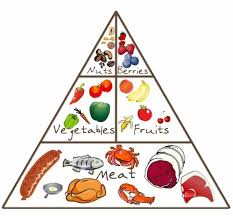The paleo diet is a diet I, like many people, was unaware of. A couple years a go, a friend of mine decided to switch to this life-style. After hearing these great benefits my friend was experiencing, I decided to try it our for a month last year. To be honest, it was very difficult at first, but once I started to feel a positive affect from it, I could understand why some people commit to this diet for life. Although, since it is a very restrictive diet I decided to ask the in long term effect, is it actually healthy?
For those of you who don’t know what a paleo diet, or the “caveman” diet is, it’s basically, the supposed diet of our great ancestors. It consists of a high-protein, low-carb diet. It includes most fruits and vegetables, meats, nuts, and eggs. It excludes all grains (anything made from flour or other grains), legumes (including peanuts since they are technically legumes), dairy, and any type of processed foods.
Now we can revisit the question, is this lifestyle healthy? I say lifestyle since we are looking at the effects of it in the long run. According to the Scientific American, they say the diet can be considered unnecessary and possibly dangerous because of the restrictions. They also use the term “half-baked” when describing the diet suggesting only half of it is widely accepted medically. This is due to cutting processed foods high is sodium, sugar, refined flour, and other potentially harmful chemicals is good for your overall health. On the contrary though, it cuts out health benefitting foods such as dairy, grains, and beans. That claim is that our bodies still need these food sources because, since the time of our ancient ancestors , our bodies have evolved and rely on these sources to maintain good health.
, our bodies have evolved and rely on these sources to maintain good health.
Although, some people who follow the paleo lifestyle closely say our bodies haven’t changed as much as we think and that we still need to follow this diet to stay our healthiest. This leads me to ask, how much have our bodies changed since our ancestors?
In studies conducted by Dr. Stephan Guyenet, who sides with positive effects from the paleo diet, he says that according to where our ancestors descend from determines how longs they have been consuming grains. I found this information to be a major confounding factor to how various people may have genetically changed. This is also agreed upon in the Scientific American. For example, the origin of wheat was 11,500 years ago but the Western-European region has only been consuming grains for roughly 7,000 years. According to Guyenet, this time-span is considered very little time for humans to fully develop adaptation to this food source although, another problem with his study is that he only looks at the source of grains excluding legumes and dairy.
Although, Guyenet then explains how we have adapted a couple genetic mutations. Most importantly, the salivary amylase gene. This has been proven to aid in the digestion of starchy foods. Although, the other include the angiotensin-converting enzyme (ACE) and apolipoprotein B genes, which are gene proteins connected to blood pressure and cholesterol. These factors both respond well to a low-carb diet which suggests that keeping a low-carb diet may aid in a healthy cardio-vascular system.
This is also supported by a study in the Czech Republic of people who have a large in-take of carbohydrates but also varied in the three genotypes II (most obese at 42%) ID (37%) and DD (36%) with a p value of 0.04. This p-value rules out genotype II since its difference with the other two genotypes is ab ove the p-value. In summary, the study includes measurements of carb intake, sex, and BMI to support variable significance, although they do not mention age which can have an effect in the accuracy of the study.
ove the p-value. In summary, the study includes measurements of carb intake, sex, and BMI to support variable significance, although they do not mention age which can have an effect in the accuracy of the study.
More research in The Scientific American shows although in addition to the amylase mutation, there is another mutation seen around 7,000 years ago involving our ability to have lactose tolerance when dairy became available after infancy (when we utilize our mother’s milk) yet, some people don’t develop this mutation, leaving them lactose-intolerant. Other mutations include tolerance to malaria, and blue-eyes. In addition, there have been many produce products that have mutated over time that were not consumed by our ancient ancestors leaving even more room for variance of defining the paleo diet in today’s day. We will never know exactly what our ancestors ate, making this another confounding variable.
There are so many studies that look at the positive and negative effects, and further historical information that support each side. The research I made looked at both of these opinions, although with the significant value of variables present among each side, it is impossible to make a reliable conclusion. Although since from both sides, they do agree there is some positive affect on our health from the paleo diet but little evidence suggesting this. In return, we have to accept the null variable that the paleo diet isn’t healthy in the long run. Although, in real life, people see results including some healthy and some negative. This then concludes in real-life, there still is something going on with support from the study done with a likely true p-value. This then concludes as a false-negative.
http://wholehealthsource.blogspot.com/2008/07/grains-and-human-evolution.html
http://nomnompaleo.com/paleo101
https://www.scientificamerican.com/article/why-paleo-diet-half-baked-how-hunter-gatherer-really-eat/
http://wholehealthsource.blogspot.com/2008/07/grains-and-human-evolution.html
